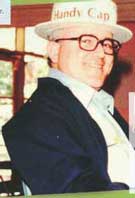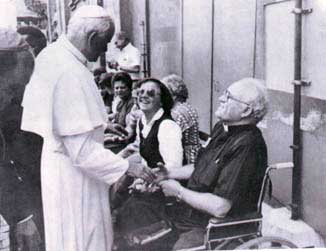 Month 3, 1932–January 2, 2009
Month 3, 1932–January 2, 2009
Fr. Robert J. Ronald, SJ, of Operation de-Handicap, Taiwan, Retires
(Christmas 2003 Letter)
My dear friends:
It’s been a special year. On January 1, at age 70, I retired from my job at the Veterans General Hospital after 31 years as consultant for vocational evaluation. I now have a new job as an English consultant at the Jesuit-run Kuangchi Program Service. I spent two and one-half months visiting relatives and friends in the States and Philippines. In August I was one of nine persons in Taiwan chosen to receive a Medical Service Award presented by President Chen Shui-Bien. On September 27th we celebrated the 30th anniversary of Operation De-Handicap which Ignatius Huang and I founded 30 years ago. In October, I moved from the Vincentian parish church in Shihpai, where I resided for 31 years, to the Jesuit community of Kuangchi Program Service in Taipei.
 When I got polio in Taiwan in 1958, there were no rehabilitation facilities. Thirteen years later when I first began work as a vocational rehabilitation consultant in Taipei, there were already several good rehabilitation medical facilities offering therapy services, but few if any follow-up services. Rehabilitation patients often went home to vegetate for lack of follow-up. They did not know where to go or what to do. They were in need of counseling and guidance, information and referral. So I began to dream of starting such a service myself, if only I could find someone motivated and qualified enough to help me.
When I got polio in Taiwan in 1958, there were no rehabilitation facilities. Thirteen years later when I first began work as a vocational rehabilitation consultant in Taipei, there were already several good rehabilitation medical facilities offering therapy services, but few if any follow-up services. Rehabilitation patients often went home to vegetate for lack of follow-up. They did not know where to go or what to do. They were in need of counseling and guidance, information and referral. So I began to dream of starting such a service myself, if only I could find someone motivated and qualified enough to help me.
Then one day, an old friend, Ignatius Huang, dropped by to say hello. For several years he had been moderator, counselor, and role model for boarders in a middle school youth center for boys where I had also served. Though he ruled them with an iron hand, they treasured his advice and respected him as Big Brother. Dedicated to the ideals of service for others, he had come to tell me that though his college major had been in the field of printing and publishing, he had decided to accept an invitation to join the staff of a Lifeline telephone emergency and counseling service in his home town. I felt that Ignatius’ character and talent of dealing with people were just what I was looking for. So I asked him to consider coming to work for me instead. With his fiancée’s agreement to this change in their plans, he accepted and our partnership was born. Mr. Huang would be the contact person, counselor, and guide for our “clients” and help them to find training and jobs and sometimes, it also turned out, help them find suitable husbands or wives. I would do my best to find the needed funds and support.
The English name Operation De-Handicap expresses the goal of ODH to help remove the physical and social barriers which prevent persons with disability from leading normal productive lives in spite of their disabilities. The Chinese name of ODH is “Geng Sheng (Better Life) Rehabilitation Service Center,” based on a Chinese saying “Dz li Geng Sheng” which means “to better one’s own life through one’s own efforts.”
ODH is a center for helping persons to help themselves. The ultimate responsibility for rehabilitation lies on the shoulders of the disabled themselves.
In principle, we decided that the counseling services would be free. Seminars, excursions, or other activities would be charged at cost, but those who could not afford the charges would be subsidized, if possible. From the very beginning it was our intention not only to be a resource of information for persons with disability, but also for all those in the community who wished to assist in their rehabilitation, including other rehabilitation service personnel.
In the beginning, most ODH cases were polio survivors, for whom we have published two manuals about how to deal with the debilitating effects of the post-polio syndrome which is affecting more and more of them. One day 15 years ago a doctor who was treating five families who had children with Duchenne muscular dystrophy, an hereditary progressively debilitating disease that affects young male children, requested ODH to counsel and advise the parents. Since then we have been providing regular information, holding seminars, helping families anticipate and cope with problems, and sending out a regular newsletter to over 120 families for their mutual support and exchange of information and experiences, and we have published two muscular dystrophy handbooks. For the past 25 years, Operation de-Handicap has published a quarterly Restoration Magazine in Chinese that now goes out to 2,500 people and agencies all over Taiwan. It contains information about pertinent rehabilitation issues, editorials and personal experiences of persons with disability.
ODH also maintained an internet web page. (no longer online).
I am proud of the achievements of Operation De-Handicap, but the only thing I can take credit for is founding it and supporting it through the gathering of donations. The credit for all the work belongs to Ignatius Huang, his assistant for sixteen years, David Chi Li-wei, and the hundreds of others who volunteered their help over the years. These services would also never have been accomplished without the prayers and support of all our benefactors in Taiwan and abroad. May God shower you all with His blessings. Enclosed is a copy of our 3011 Anniversary Book. It is all in Chinese, but the photos tell the story without words. With this gift come our wishes that you may all enjoy a blessed holidays and a healthy prosperous new year.
God bless,
Fr. Bob Ronald, SJ
